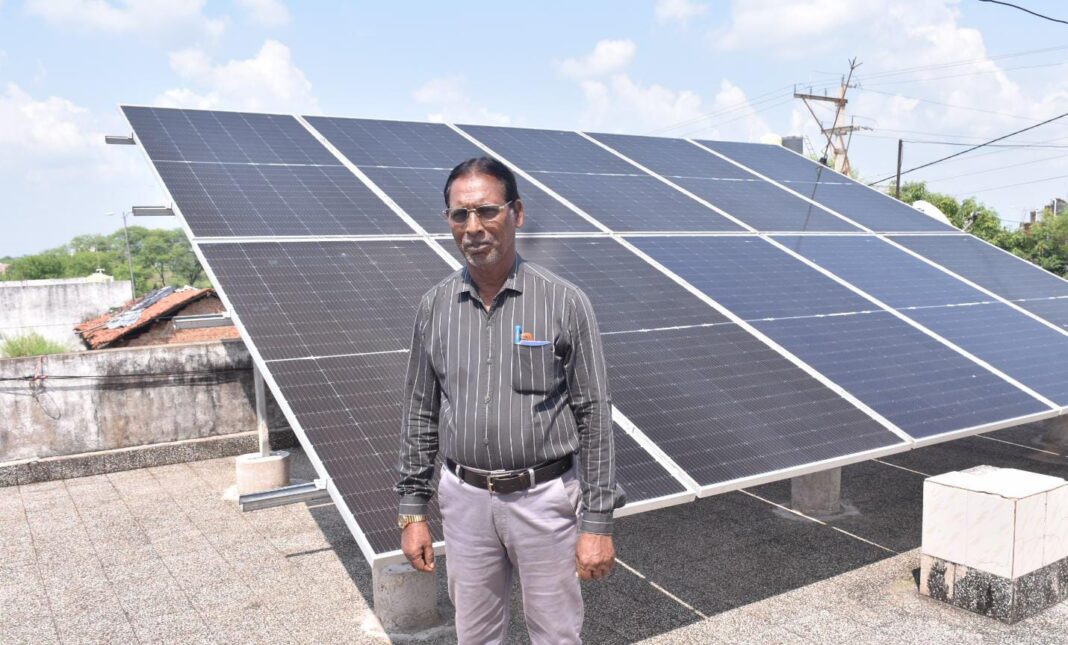Rajnandgaon Resident Benefits from Rooftop Solar Installation, Achieves Zero Power Bill and Becomes Energy Producer
Published on: October 03, 2025
By: BTNI
Location: Rajnandgaon, India
The Prime Minister Surya Ghar Free Electricity Scheme is proving to be a blessing for ordinary households across India. In Rajnandgaon, Chhattisgarh, resident Giridhar Lal Dewangan has set an inspiring example by installing a rooftop solar power system that not only meets his family’s electricity needs but also contributes surplus energy to the grid. His success story reflects the transformative potential of the scheme in promoting renewable energy, reducing household expenses, and driving India toward energy independence.
Scheme Bringing Light and Savings
The Pradhan Mantri Surya Ghar: Muft Bijli Yojana was launched with the vision of providing up to 300 units of free electricity every month to one crore households by encouraging rooftop solar adoption. By offering subsidies and simplified application processes, the scheme aims to empower citizens to become energy producers rather than mere consumers.
For Rajnandgaon’s Gauri Nagar resident, Giridhar Lal Dewangan, the scheme has turned into a life-changing opportunity. On learning about the program through newspapers, he applied promptly and installed a 5.5-kilowatt rooftop solar system on his house.
The total installation cost was around ₹3.40 lakh. Out of this, Dewangan received a central government subsidy of ₹78,000, and he is set to receive an additional ₹30,000 subsidy from the Chhattisgarh state government. With subsidies covering about ₹1.08 lakh, the effective investment was cut nearly in half, making the project financially viable.
Also read- https://www.btnewsindia.com/cm-sai-issues-stern-directive-on-gem-portal-irregularities-in-government-procurements/ https://www.btnewsindia.com/statewide-celebrations-usher-in-vijayadashami-amid-school-holidays-and-festive-preparations/
From Electricity Bills to Energy Production
Before switching to solar, Dewangan’s household consumed an average of 510 units of electricity per month. In the very first month after installation, the solar panels generated 615 units — 105 units more than his consumption.
The extra power was supplied back to the grid, earning him credits for future use. As a result, his electricity bill has already dropped to zero.
Speaking to BT News India, Dewangan said, “Earlier we only consumed electricity. Now, we are generating it. This scheme has turned our home into a mini power station. In just 4–5 years, I will recover the cost of the system, and for the next 20–25 years, we will enjoy free electricity.”
Environmental Benefits Alongside Financial Relief
Apart from household savings, the scheme contributes to clean energy adoption and reduces dependence on coal, petroleum, and natural gas. By promoting solar energy, India can curb carbon emissions, pollution, and climate change impacts while moving toward its global commitments on sustainable energy.
Dewangan highlighted that the savings from electricity bills are now being redirected toward his children’s education and other family needs. He expressed gratitude to Prime Minister Narendra Modi and Chief Minister Vishnu Deo Sai for empowering common citizens through renewable energy.
He also appealed to fellow citizens to enroll in the Surya Ghar scheme, reduce their electricity expenses, and help make India energy self-reliant.
A Growing Movement in Chhattisgarh and Beyond
Chhattisgarh, with its abundant sunshine, has been identified as one of the key states where rooftop solar installations can play a transformative role. Thousands of households are already applying for the Surya Ghar scheme, and officials believe the program will not only reduce household costs but also create green jobs in installation, maintenance, and solar equipment manufacturing.
Experts note that rooftop solar has the potential to decentralize energy production, reduce pressure on traditional grids, and strengthen India’s overall energy security.
The Road Ahead
The story of Giridhar Lal Dewangan is not just a personal success but a demonstration of how public welfare schemes can create ripple effects in society. If widely adopted, the Surya Ghar initiative could revolutionize India’s energy landscape, shifting the country from dependency on fossil fuels to an era of sustainable, citizen-driven power generation.
As the government pushes forward with its vision of “Amrit Kaal” and energy independence, stories like Dewangan’s showcase the ground-level impact and inspire more households to take the solar leap.



